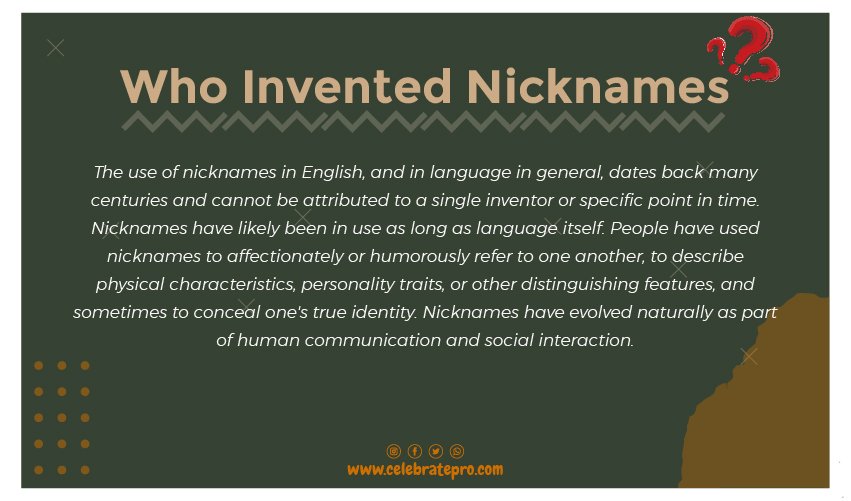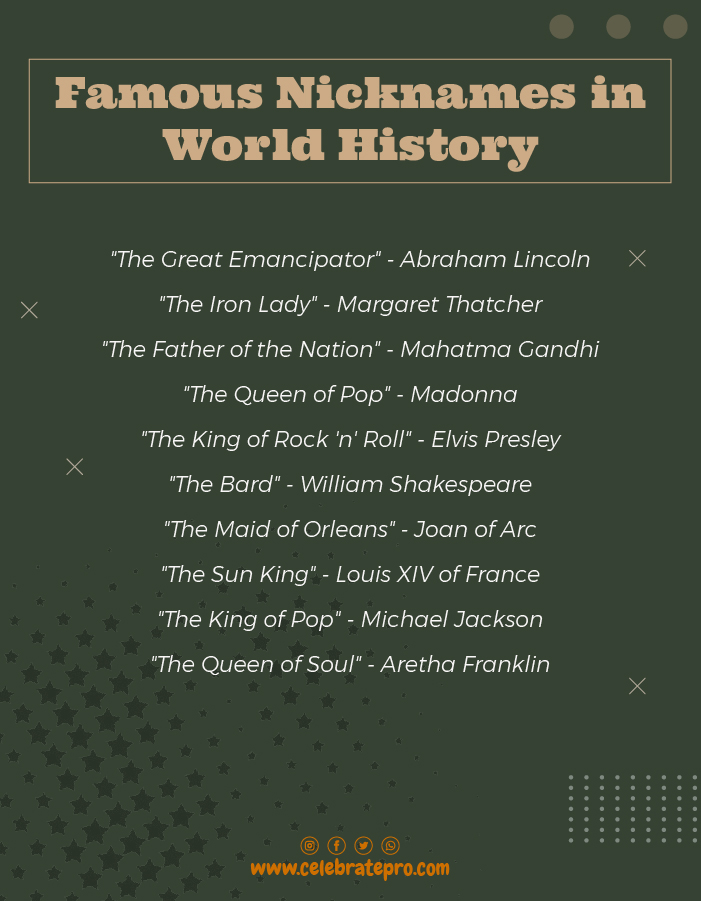Have you ever wondered how nicknames came to be? These playful monikers have been an integral part of human culture for centuries, adding a touch of familiarity and endearment to our interactions. In this article, we will delve into the fascinating History And Origin And History of Nicknames.
Exploring their invention, their presence in ancient civilizations, their evolution in the digital age, famous examples throughout world history, their role in military contexts, and even speculate on future trends and predictions. So, let’s embark on this journey to uncover the captivating stories behind the names we affectionately call each other.
History of Nicknames: Where Did They Come From
Nicknames have a rich history that dates back to ancient times. They emerged as a way to differentiate individuals within a community, often based on physical attributes, personality traits, or notable achievements. In early societies, where formal names were less common, nicknames served as a practical means of identification.
As civilizations evolved, so did the purpose and usage of nicknames. In medieval Europe, for instance, surnames were not yet widespread, and individuals were often referred to by their occupation or place of origin. These descriptors gradually transformed into inherited family names, but nicknames persisted as a way to distinguish individuals with similar names.
Who Invented Nicknames:
The invention of nicknames cannot be attributed to a single individual, as they emerged organically across different cultures and time periods. However, it was human nature’s innate desire to categorize and differentiate that led to the creation of these affectionate monikers.
In ancient Greece, for example, the poet Homer frequently used epithets to describe characters in his epic poems, such as “rosy-fingered Dawn” or “swift-footed Achilles.” These descriptive phrases acted as early forms of nicknames, highlighting specific qualities or characteristics.

For More:
- Difference Between Nickname And Short Name
- Why Do People Give Each Other Nicknames
- What Is A Nickname
Nicknames in Ancient Civilizations: From Egypt to Rome
Ancient civilizations embraced nicknames as a way to encapsulate an individual’s essence or achievements. In Egypt, pharaohs were often bestowed with grandiose titles, such as “Ramses the Great” or “Cleopatra the Magnificent,” which served as both nicknames and symbols of power.
In Rome, nicknames played a significant role in society. Roman emperors, like Gaius Julius Caesar, were often given honorific titles like “Augustus” or “Imperator,” which became synonymous with their reign. These nicknames not only reflected their authority but also shaped their legacy.
The Evolution of Nicknames in the Digital Age
With the advent of the digital age, nicknames took on new forms and meanings. Online communities and social media platforms provided fertile ground for the proliferation of pseudonyms and usernames. These digital nicknames allowed individuals to craft new identities, express creativity, and maintain a level of anonymity.
Furthermore, the rise of instant messaging and texting popularized the use of abbreviations and acronyms as nicknames. Phrases like “LOL” (laugh out loud) or “BFF” (best friends forever) became common shorthand, fostering a sense of camaraderie and connection in the digital realm.
Famous Nicknames in World History:
Throughout history, certain nicknames have become etched in our collective memory, forever associated with the individuals who bore them. Here are some famous examples:
- Alexander the Great – This nickname was bestowed upon Alexander III of Macedon, who conquered vast territories and established one of the largest empires in history.
- The Iron Lady – Margaret Thatcher, the first female Prime Minister of the United Kingdom, earned this moniker due to her uncompromising leadership style.
- The Bard – William Shakespeare, the famous playwright and poet, is often referring to as “The Bard” for his unparalleled contributions to literature.

Boys Nicknames
- Ace
- Bear
- Dash
- Fox
- Jet
- Max
- Neo
- Rex
- Zephyr
- Blaze
- Duke
- Hunter
- Maverick
- Ryder
- Zeus

Pet Nicknames
- Buddy
- Coco
- Daisy
- Gizmo
- Luna
- Milo
- Peanut
- Rocky
- Shadow
- Bella
- Charlie
- Daisy
- Ginger
- Max
- Oliver
For More:
- 103+ Dallas Nicknames Ideas That Will Blow Your Mind
287+ Agamemnon Nicknames That Will Leave You Amazed
All Alphabetical Wise Nicknames For Boys. A-Z
Girl Nicknames
- Angel
- Blossom
- Daisy
- Honey
- Lily
- Pearl
- Ruby
- Star
- Bella
- Cherry
- Grace
- Luna
- Mia
- Rosie
- Violet
Crush Nicknames
- Sweetie
- Darling
- Honey
- Cutie
- Angel
- Prince/Princess
- Sunshine
- Boo
- Lovebug
- Heartthrob
- Cupcake
- Snugglebear
- Dreamboat
- Sugarplum
- Adorable
Nicknames For Best Friend
- Buddy
- Pal
- Chum
- Amigo/Amiga
- Partner-in-crime
- Sidekick
- BFF (Best Friend Forever)
- Comrade
- Homie
- Pals-for-life
- Soulmate
- Confidant(e)
- Ally
- Cohort
- Brock
Best Nicknames For Boyfriend
- Baby
- Sweetheart
- Love
- Darling
- Prince Charming
- Romeo
- My King
- Superman
- Boo
- My Love
- Heartthrob
- Handsome
- My Everything
- My Hero
- My Sunshine
Nicknames For Girlfriend
- Baby
- Sweetheart
- Love
- Darling
- Princess
- Juliet
- My Queen
- Superwoman
- Boo
- My Love
- Heartbreaker
- Beautiful
- My Everything
- My Angel
- My Sunshine
The Role of Nicknames in Military History
Nicknames have played a significant role in military history, fostering camaraderie among soldiers and creating a sense of identity within units. These monikers often reflect the bravery, resilience, or unique characteristics of military personnel.
During World War II, the American 101st Airborne Division earned the nickname “The Screaming Eagles” due to their distinctive shoulder insignia and their fearless reputation on the battlefield. This nickname not only instilled pride within the division but also struck fear into the hearts of their enemies.
The Future of Nicknames: Trends and Predictions
As we look to the future, it is evident that nicknames will continue to evolve alongside technological advancements and societal changes. Here are some trends and predictions for the future of nicknames:
- Personalized AI-generated nicknames: With the rise of artificial intelligence, individuals may have the opportunity to receive personalized nicknames generated by algorithms that analyze their personality traits and preferences.
- Virtual reality avatars: As virtual reality becomes more immersive, individuals may adopt unique nicknames for their digital personas, allowing for greater self-expression and creativity in virtual worlds.
- Nicknames as a form of self-branding: In an increasingly competitive job market, individuals may use catchy and memorable nicknames as part of their personal branding strategy, helping them stand out from the crowd.
Conclusion
History And Origin And History of Nicknames Have a long story , serving as a means of identification, expression, and connection throughout the ages. From ancient civilizations to the digital age, these History And Origin And History of Nicknames have evolved and adapted to reflect the changing dynamics of human society.
As we move forward, it is exciting to envision the future of nicknames, where technology and individuality intertwine to create new forms of self-expression. So, embrace the power of nicknames and let them add a touch of familiarity and warmth to your interactions.




